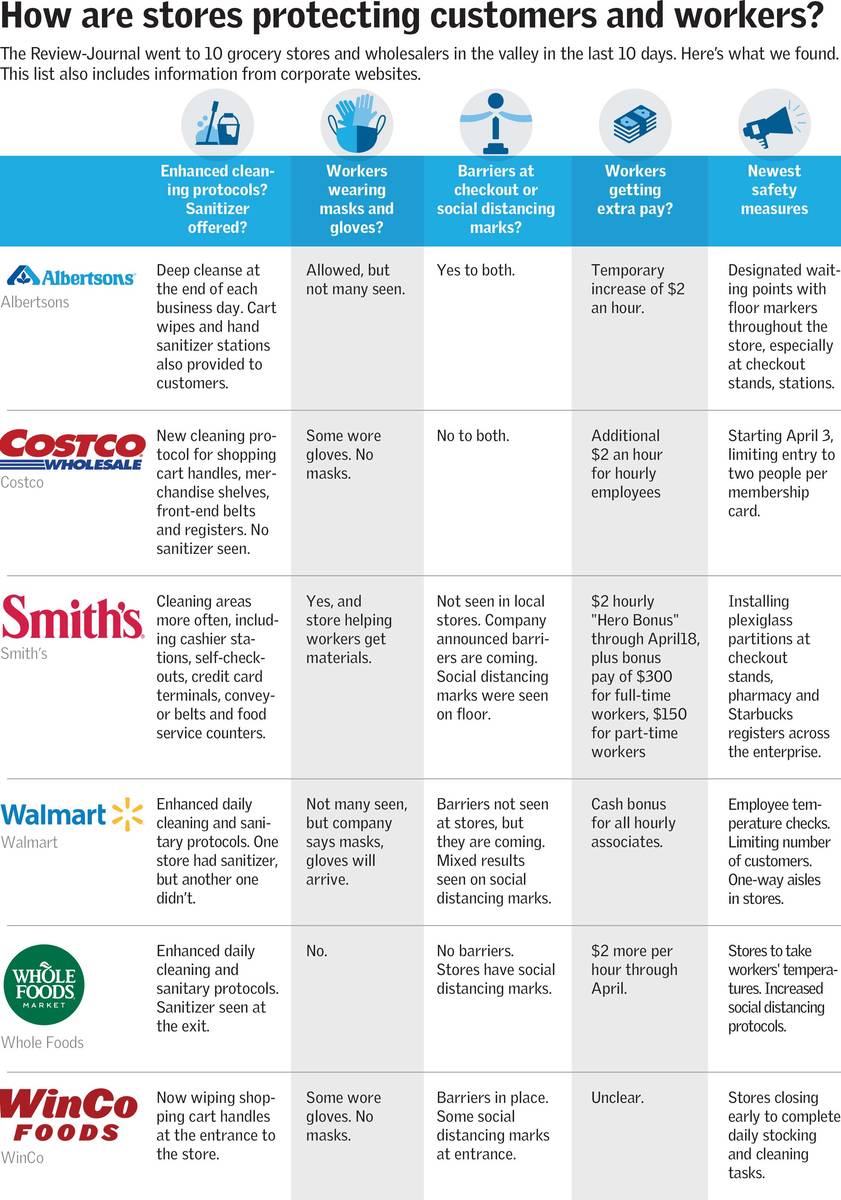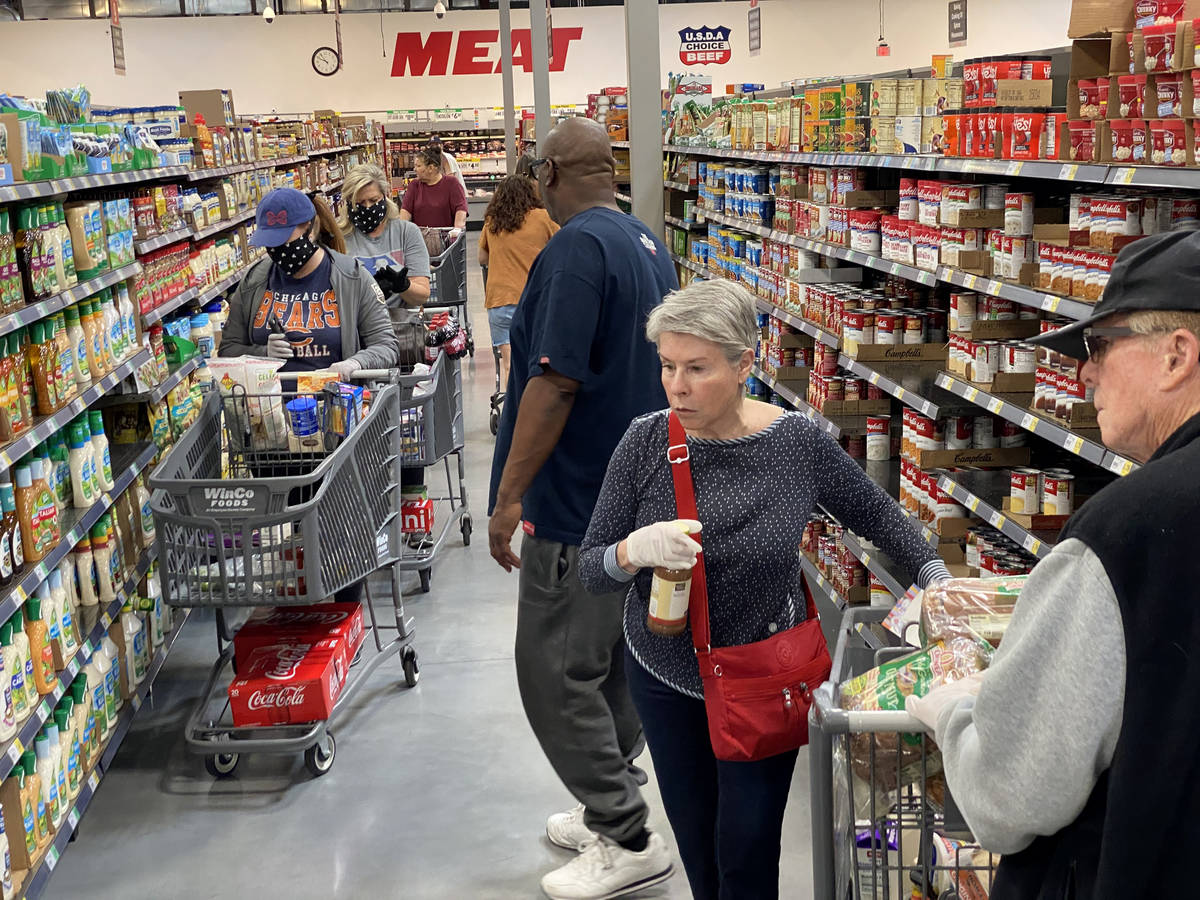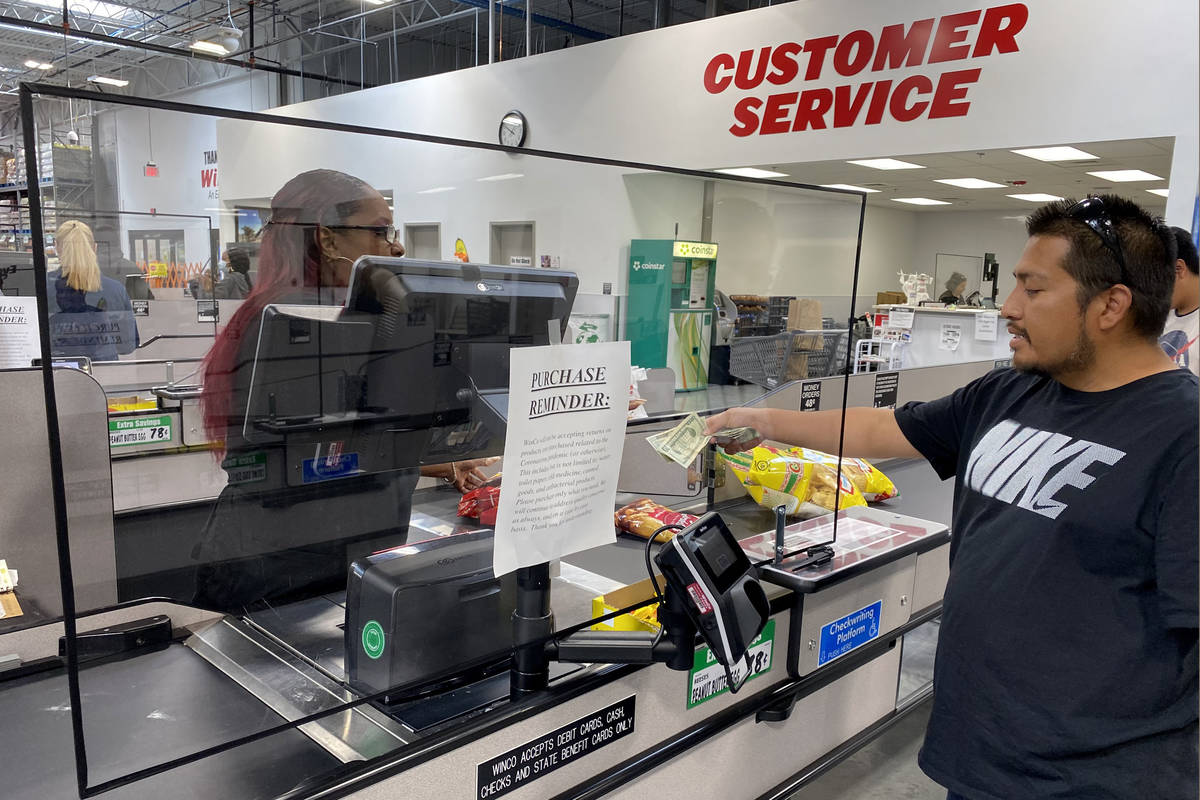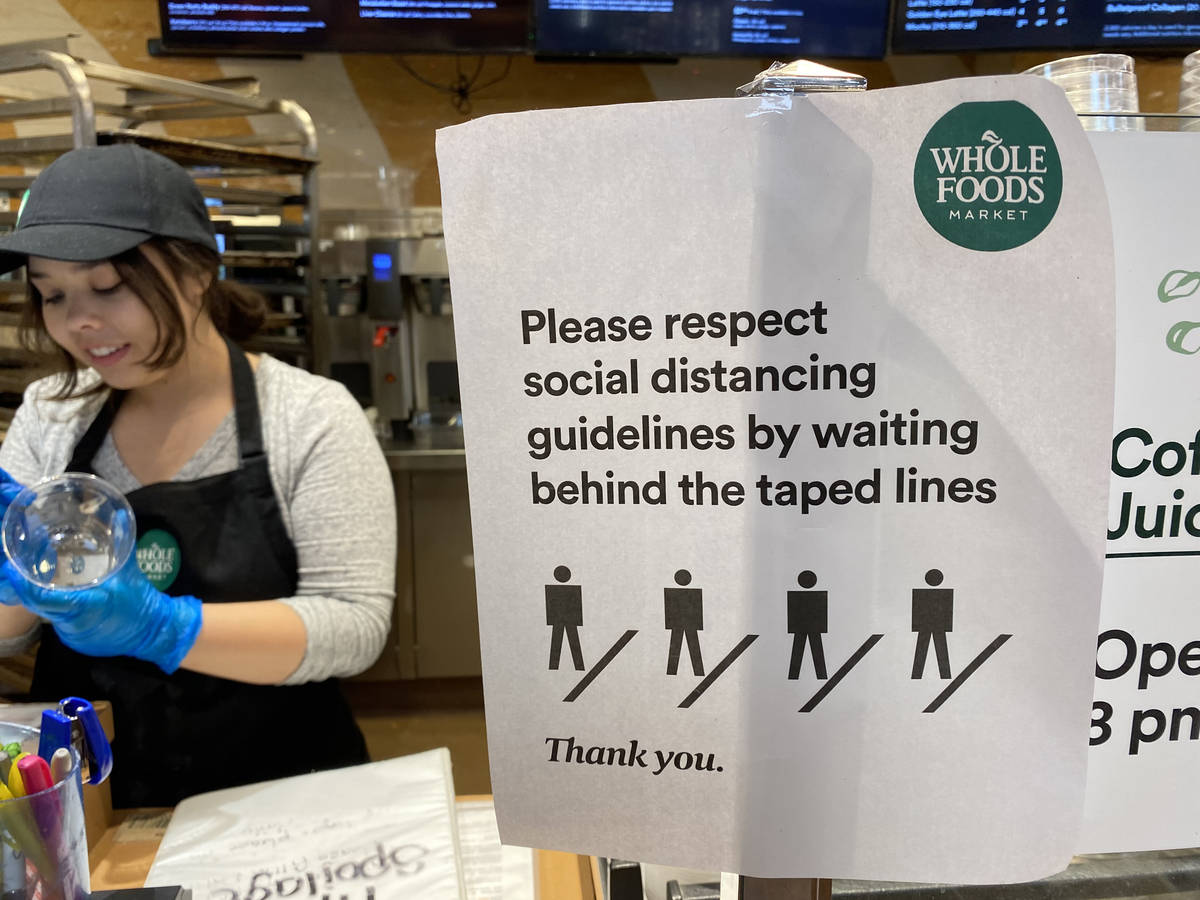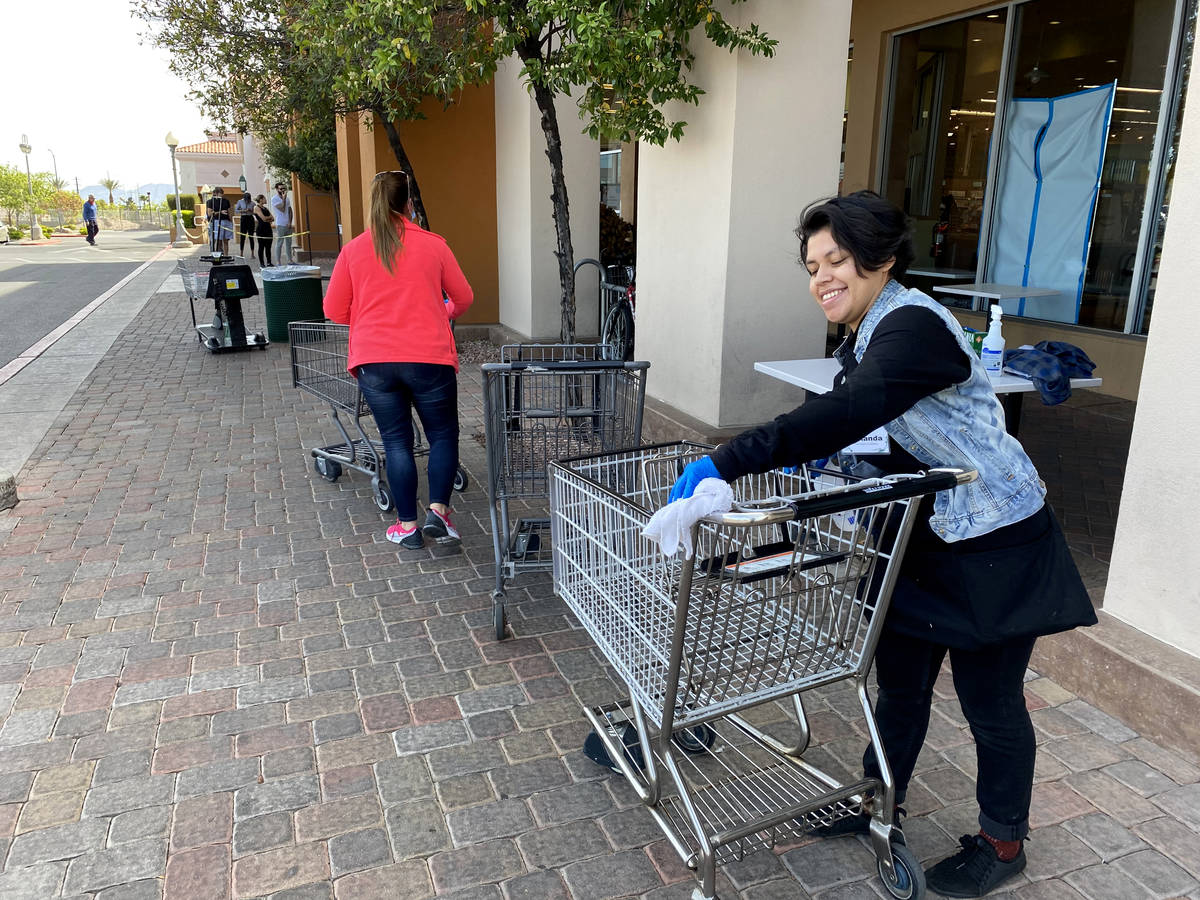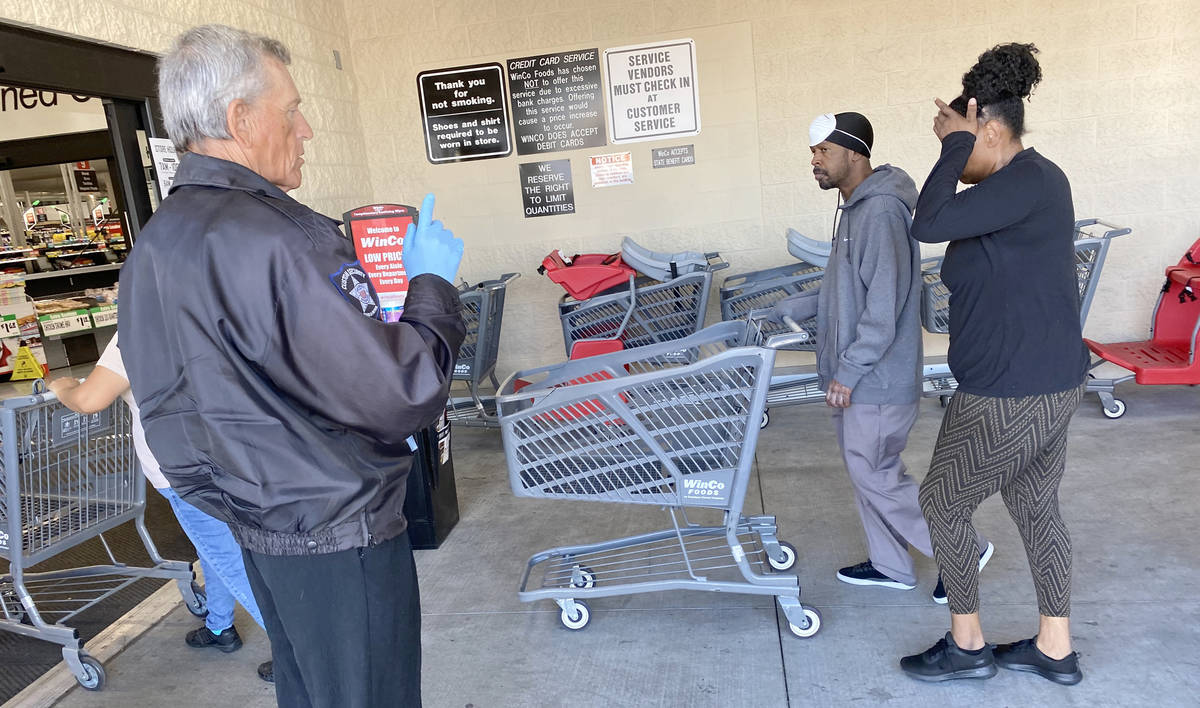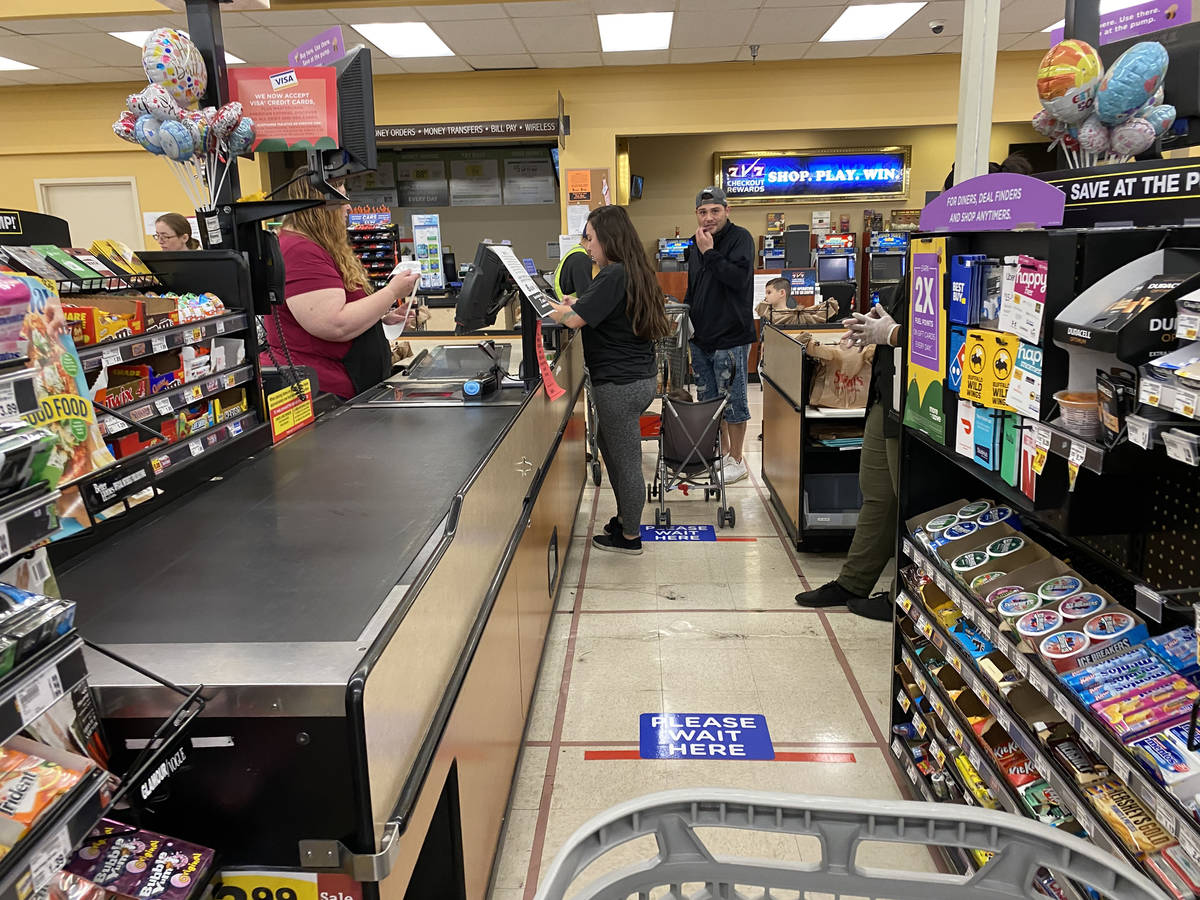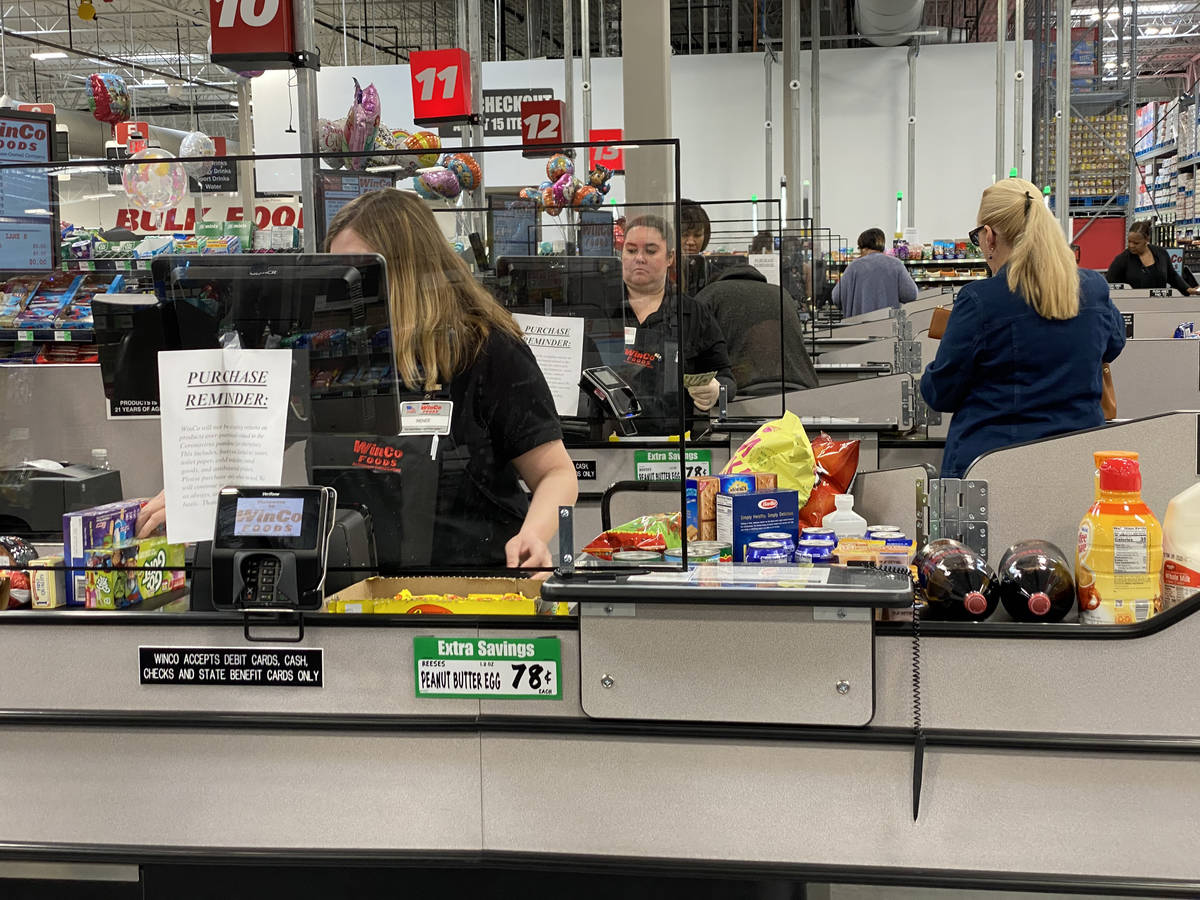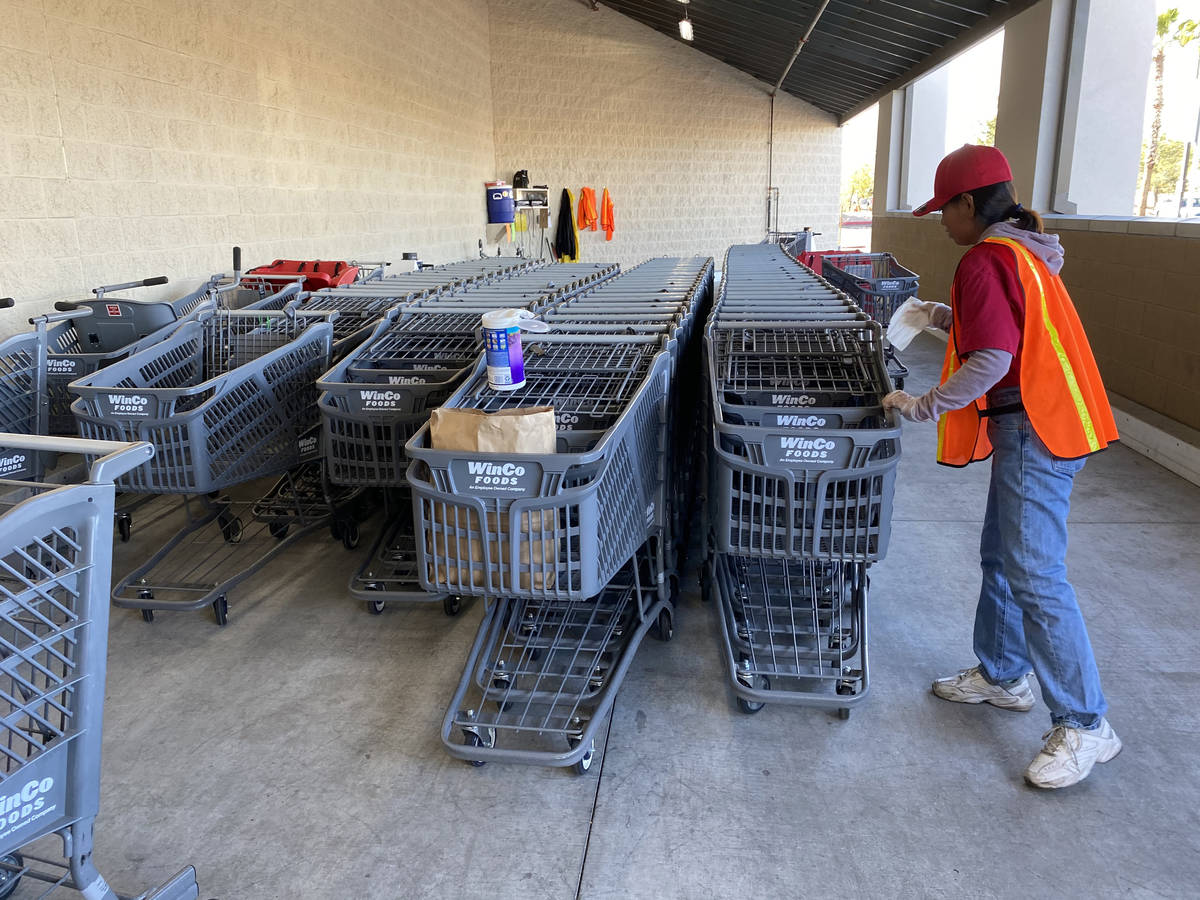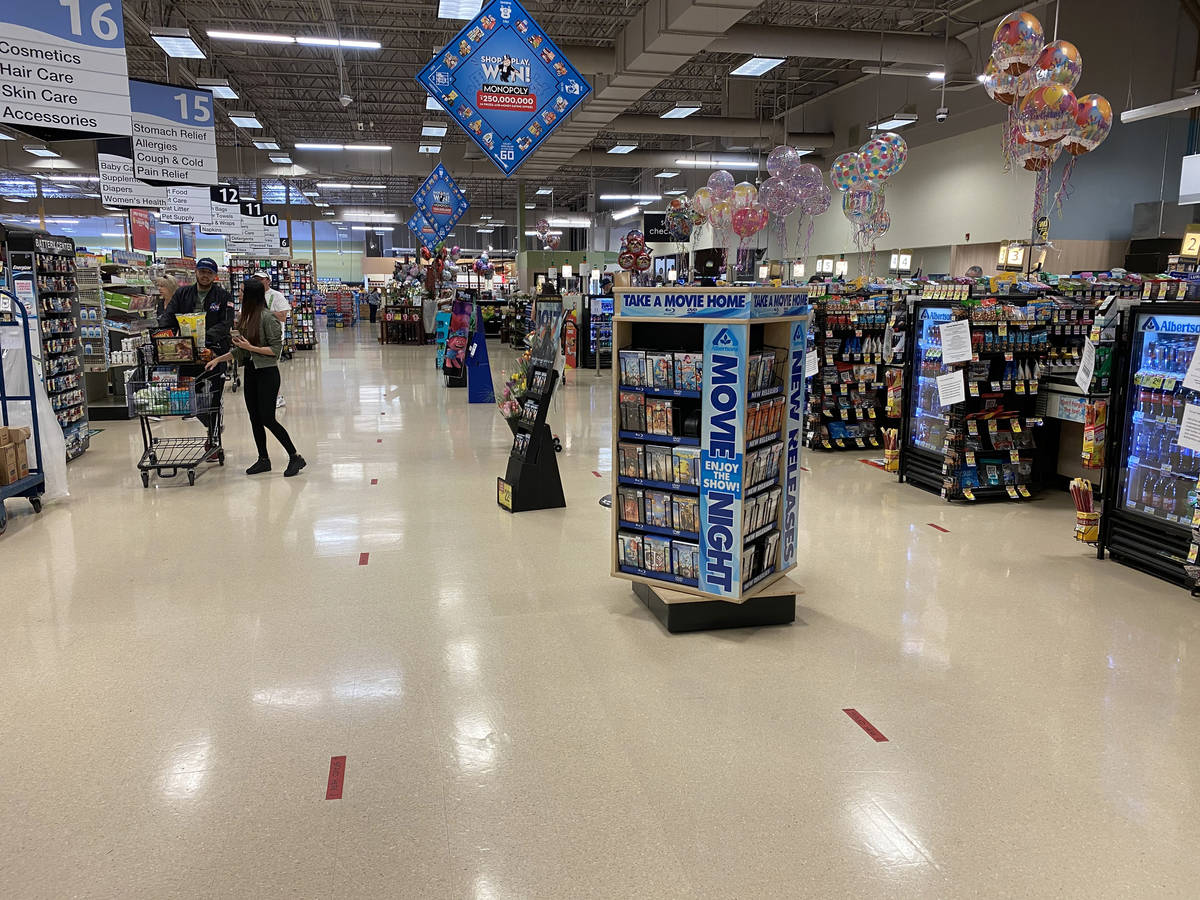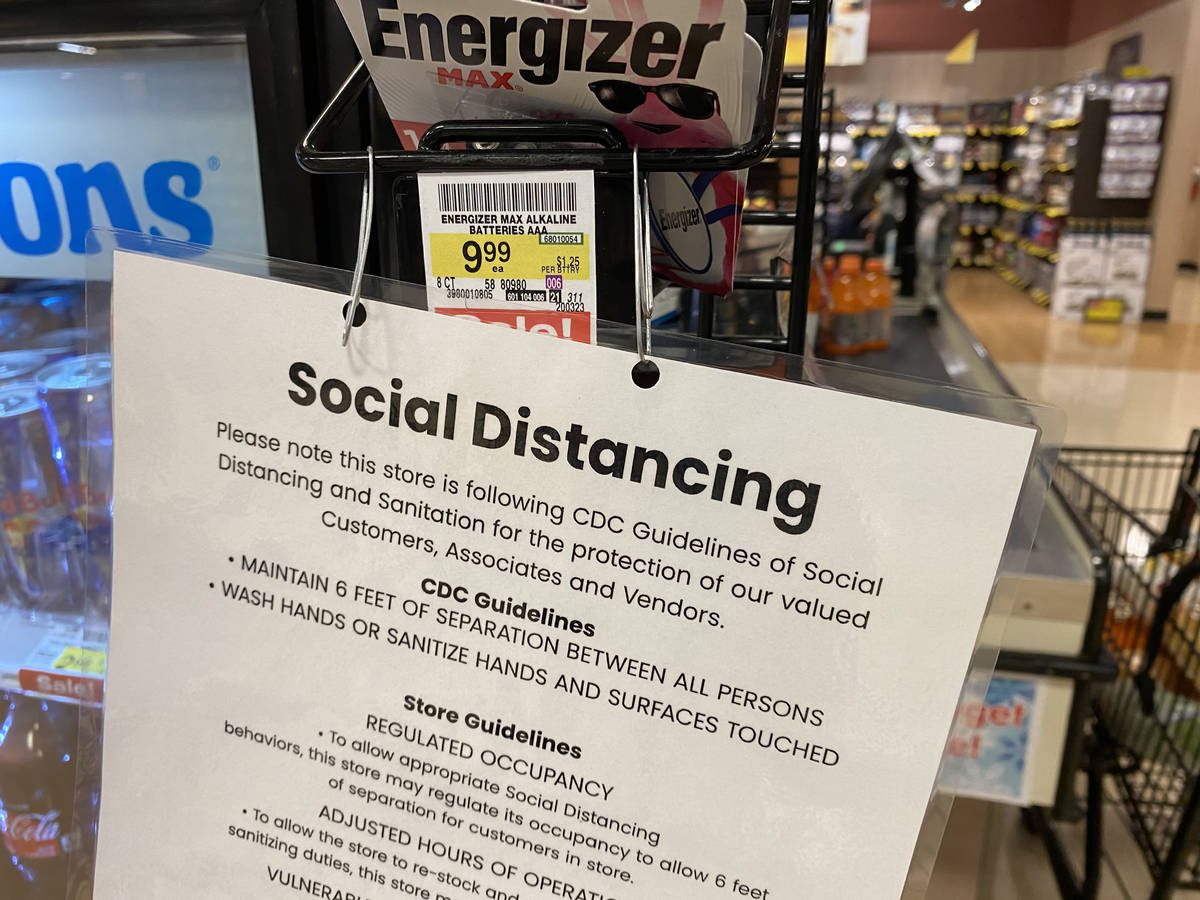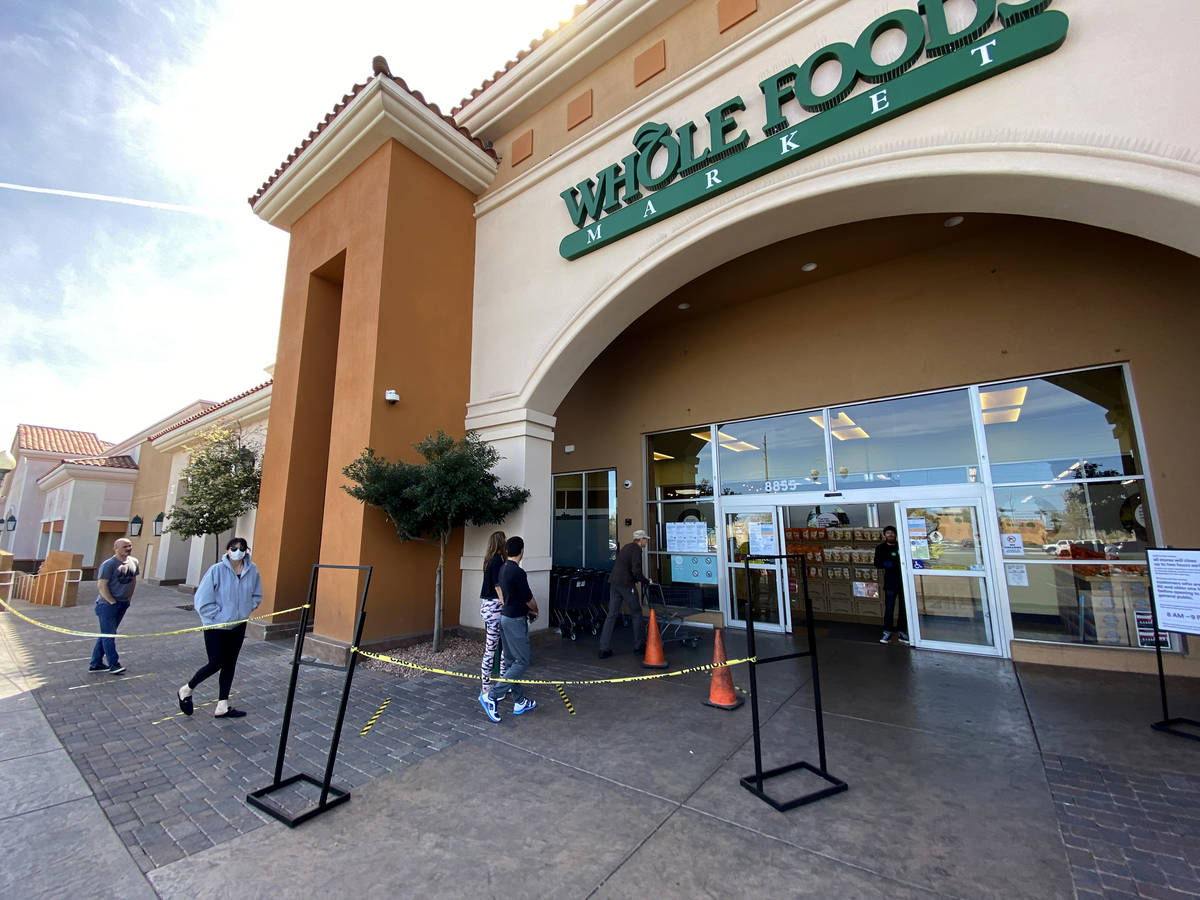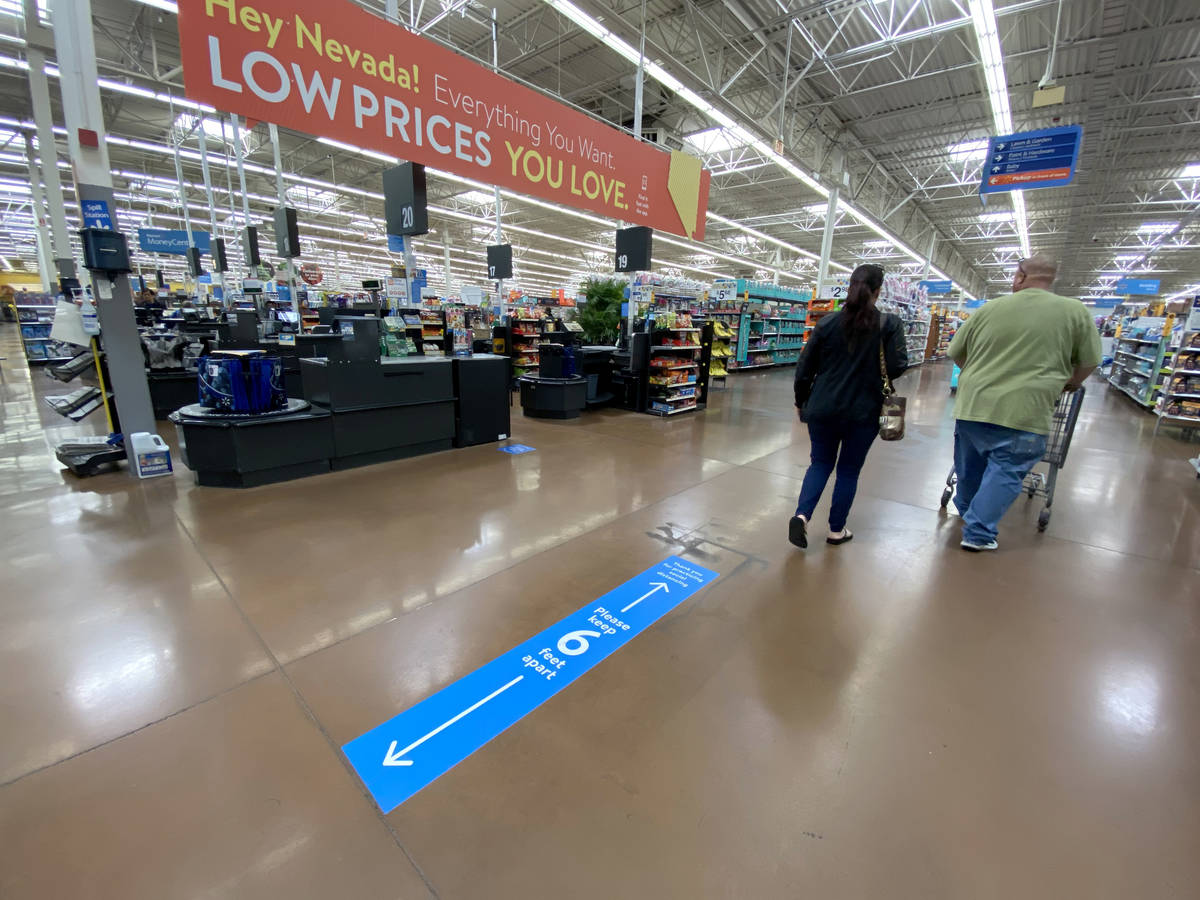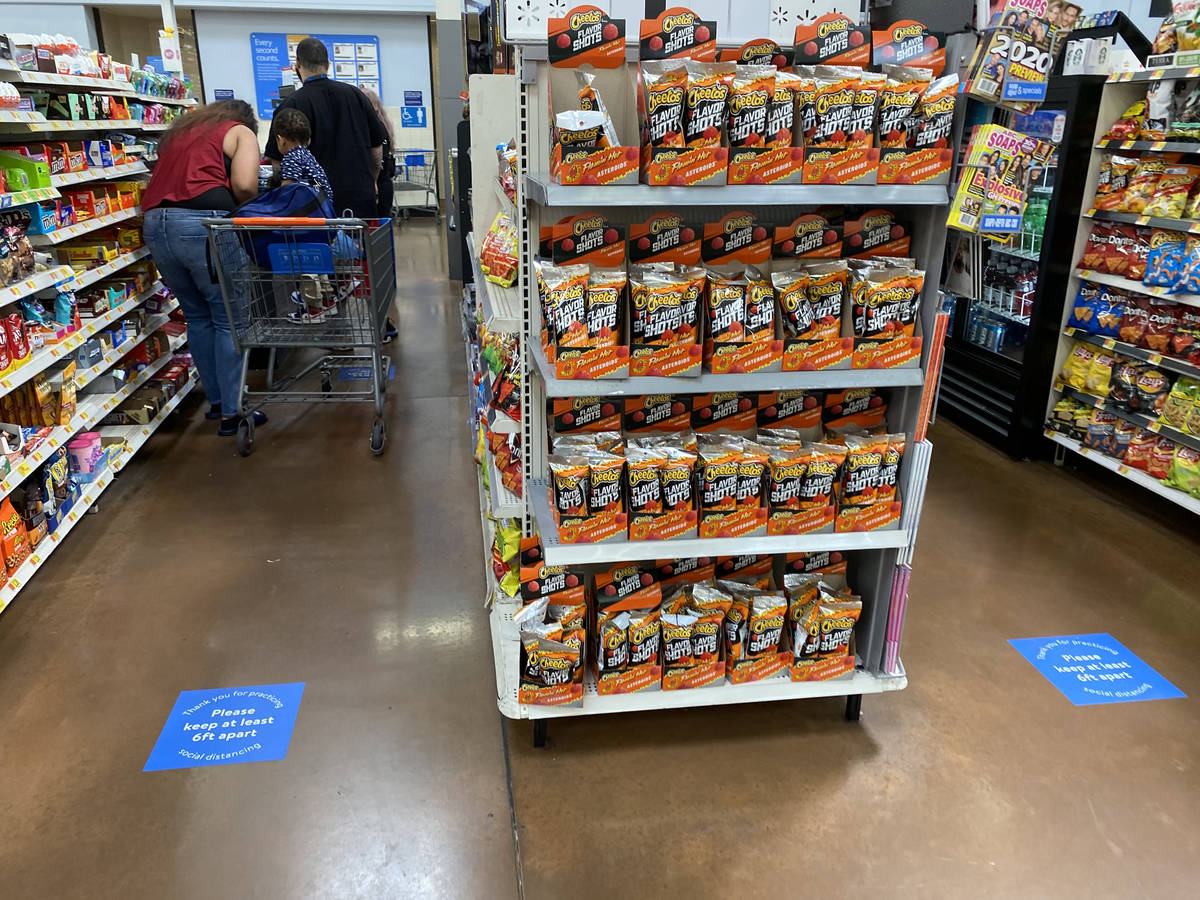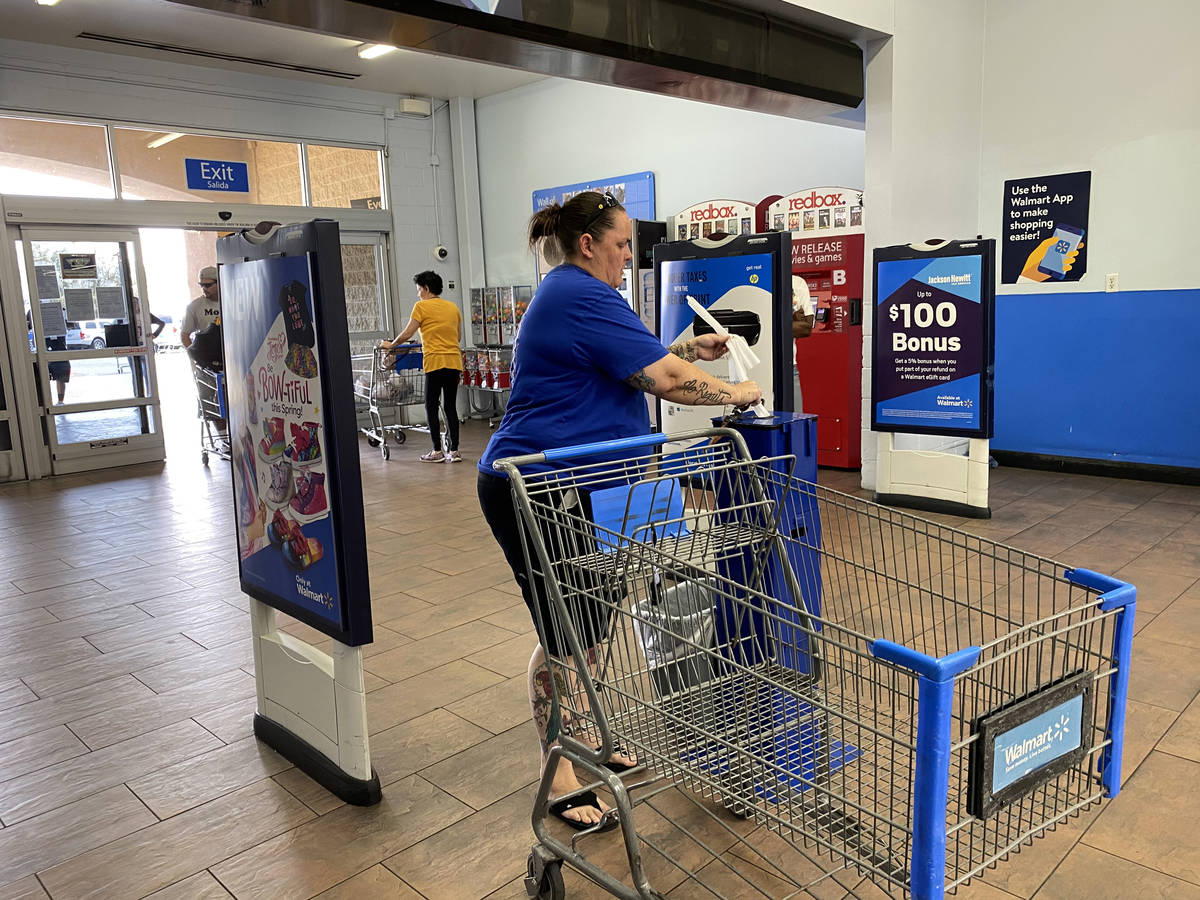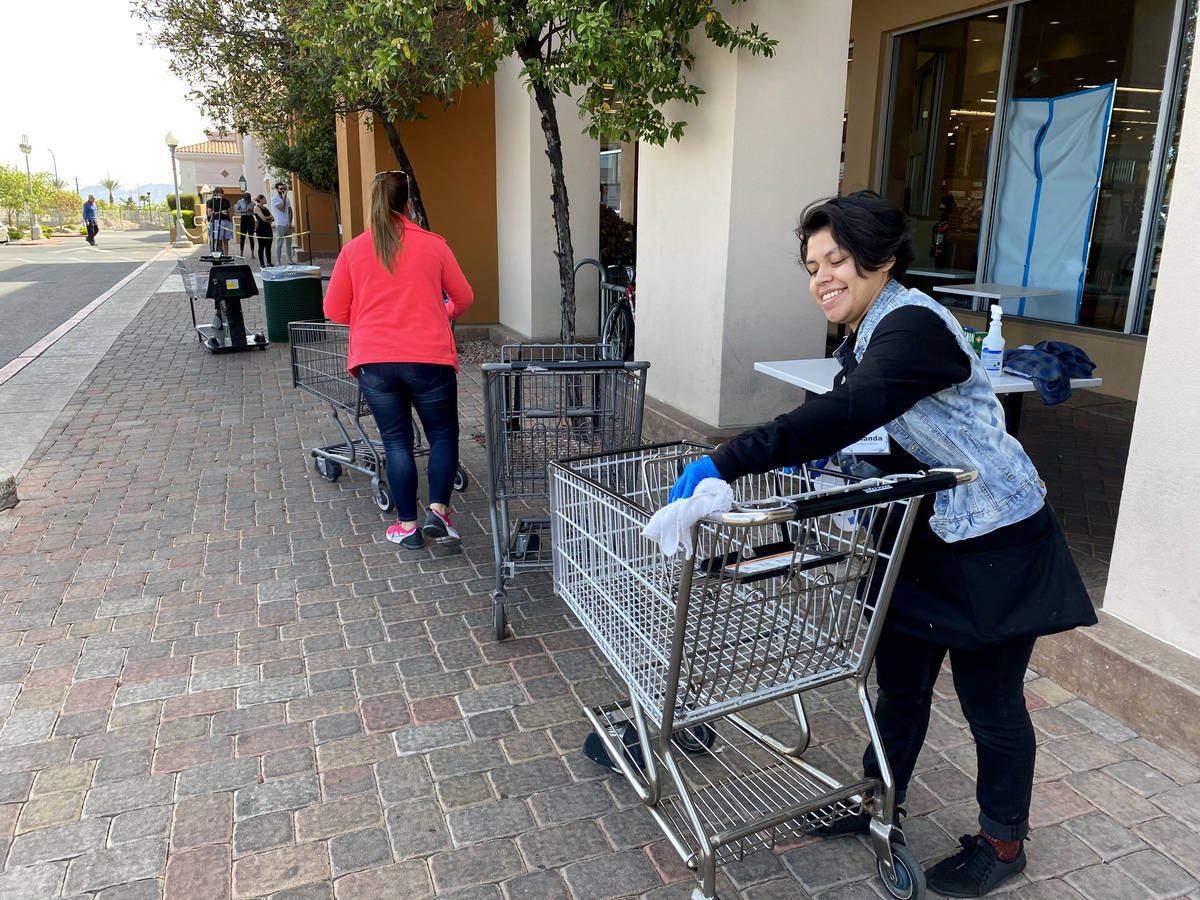Grocery workers, customers wary during virus. Stores rushing to protect them.
There are no local health regulations in place for coronavirus-related inspections at Las Vegas grocery retailers — a growing concern as workers and customers are exposed and COVID-19 numbers climb.
Declared essential businesses amid the pandemic, valley stores have withstood food and paper goods shortages as a result of hoarding as well as evolving protocols for cleaning and social distancing. And they’ve changed hours and made special accommodations to help vulnerable residents in just a matter of weeks.
But questions are being raised about health inspections and the safety of front-line workers and customers following the news that Henderson Costco employees tested positive for the coronavirus.
The Southern Nevada Health District acknowledged that it has no authority to conduct virus-related inspections.
The agency’s regulations, which must be approved by a public board, are only designed to “promote and regulate the safe handling of food items and sanitary practices of food facilities,” said Jennifer Sizemore, manager of the health district’s communications office.
Normally, sanitary inspections are conducted only in meat, seafood and produce areas, as well as snack bars, kitchens and coffee shops, records show.
Retailers have moved quickly to add considerable safety and cleaning measures to stores that remain essential to a shut-down community. As an example, Costco just announced stores will allow no more than two people to enter the warehouse with each membership card.
But the lack of coronavirus oversight has left some gaps in the way the stores are instituting safety measures, as Las Vegas Review-Journal reporters observed in multiple stores across the valley over the past 10 days.
“Somebody, either the state or the health district, needs to create uniform rules that protect employees and customers,” said Clark County Commissioner Tick Segerblom, a member of the Southern Nevada District Board of Health, which oversees the agency. “The one place you interact with other people is at the grocery store.
“It’s a critical point in which you could be exposed to the virus,” he said, “so we need to protect the customers and, more importantly, the workers who are risking their lives to help us every day.”
Michael Gittings, president of United Food & Commercial Workers Local 711 in Nevada, said his members are worried about their health amid the COVID-19 scare.
“I think everybody’s concerned,” said Gittings, who represents thousands of employees at Albertsons, Vons and Smith’s Food & Drug in the Las Vegas Valley. “This is a scary situation for everybody.”
Changes coming quickly
Additional safety measures for stores are being announced almost daily.
“We’re taking any and all measures to ensure the well-being of our customers and associates,” Walmart corporate spokesman Charles Crowson said in an email to the Review-Journal. “To that end, we remain in contact with the CDC, as well as respective state health departments, and are taking every precaution necessary to keep our stores safe, cleaned and sanitized.”
At Kroger Co., which owns Smith’s, Chairman Rodney McMullen told customers, “We activated our preparedness plan several weeks ago, and we continue to monitor the rapidly evolving situation. We’re following guidance from federal, state and local agencies, including the CDC and other health organizations.”
In a statement, Albertson CEO Vivek Sankaran said: “We have stepped up how often we clean and disinfect all departments, restrooms, and other high-touch points of the store, like check-stands and service counters. Cart wipes and hand sanitizer stations have been installed in key locations within the stores for your convenience, too.”
Southern Nevada Health District: COVID-19 guidance for food establishments
Worker concerns
But employees remain concerned. Several front-line workers reached out to the Review-Journal and were allowed to speak anonymously to protect their jobs.
One Walmart employee said stress continues to build among workers. Management has not done enough to limit the number of shoppers coming into the store, the employee said, and the constant contact worries workers.
“What stands out the most is how many people do not need to be in the store,” the worker said. “Hardly anyone comes in by themselves, gets the things they need and gets out. People come in with their spouse, their kids, their friends. They browse the clearance aisle. They smell half the candles on the shelf. They dig through the $5 DVD bin.
“We still have vendor reps stocking their product instead of doing it ourselves for the time being.”
A Walmart employee at another store said customers are practicing little social distancing, which is threatening employees’ health.
“They cough and they get right up in your face when they’re asking you a question,” the employee said. “We have a pandemic going on. It’s time they should care, and they don’t. They’re not concerned about our safety.”
Crowson said the company is aware of the employee complaints.
“We are certainly exploring possible options to address those concerns,” he said. “We ask that our customers be mindful of proper social distancing guidelines and be respectful of everyone’s space and everyone’s health and well-being.”
A Smith’s worker who emailed the Review-Journal on March 23 voiced similar concerns about customers.
“People are bringing their children, elders and families to our stores in different states of health,” the worker said. “Some people aren’t even buying things. They’re just roaming as ‘something to do.’ Some stay in the stores for hours waiting and hoping for certain items to be restocked while they are there.”
The Smith’s employee also had concerns about some sanitary conditions at the store.
“Cashier stations and belts are never wiped down,” the worker said. “They are usually wiped down, but haven’t been during the madness.”
Kroger did not respond to requests for comment.
The Nevada Occupational Safety and Health Administration is investigating COVID-19 complaints from workers. But the state agency does not address matters affecting overall public safety. A spokeswoman said it has fieleded only two complaints so far, and both came from Northern Nevada.
Action recommended
North Las Vegas City Councilman Scott Black, who chairs the health district board, said the board should examine whether health officials and elected leaders in the valley are doing enough to hold stores accountable.
“The lack of continuity is concerning,” Black said. “Collectively, we have to get people on the same page on what the guidelines say and what the expectations are for the grocery store operations.
“We’re going to look back and learn a tremendous amount of lessons from the current situation we’re facing,” he said. “This is one of those lessons in real time that we need to address going forward.”
Gittings said the grocery workers union has been working closely with stores on protective measures, including making sure they are practicing social distancing and cleanliness.
“They’re constantly cleaning and disinfecting the stores,” he said. “I think everyone wants to make health and safety a priority.”
Rapid improvements
Within the past week, more stores have set up the protective shields for cashiers and social distancing markers.
Gittings said all Albertsons, Vons and Smith’s stores are installing shields. Walmart said it is putting up barriers and working to get gloves and masks for employees. On March 31, the company announced it will begin taking workers’ temperature before their shifts start. Any employee with a temperature of at least 100 degrees will still get paid but will be sent home.
Walmart said Friday that it also is limiting the number of customers who can be in its stores at the same time, and that it plans to institute “one-way movement” through aisles in a number of stores.
Amazon, which owns Whole Foods, announced Thursday that the company will roll out temperature checks at all its stores in the next week.
Almost all stores have offered bonus pay, either in hourly boosts or as one-time payments, to both full-time and part-time workers.
Dr. Robert Amler, vice president for government affairs and dean of public health at New York Medical College, said COVID-19 guidelines are necessary “to block exposure” of the virus in one of the few places where people are congregating these days.
“When you go to the grocery store, realize that you’re going into a public space and there’s going to be some exposure,” he said. “You want to try to conserve your trips to the store. Get as much as you can with a single trip and try not to spend too much time in the store.”
Segerblom encouraged grocery store workers to speak out about their concerns, and he urged his colleagues in government to make it clear the workers don’t have to fear repercussions from their employers.
“We don’t want employees to feel like they’re being forced to work in unsafe conditions to survive,” he said.
What we observed
The Review-Journal visited 10 stores owned by several major chains — including Albertsons, Smith’s, Walmart, Whole Foods, Costco and WinCo — between March 26 and April 1 to see what safety measures had been added.
Albertsons
At an Albertsons in northwest Las Vegas, checkers were not wearing gloves or masks, but there were blue social distancing markers, 6 feet apart, leading to the checkout stands. Plexiglass sneeze guards were installed at the stands to protect the cashiers from customers. At the entrance, an employee was wiping down the handles of shopping carts with disinfectant, and there were dispensers with sanitizer.
Similar measures were taken at another Albertsons in Las Vegas and one in Henderson.
Smith’s
Some cashiers at a Smith’s store in northwest Las Vegas were wearing gloves. Most were not. Some were wearing masks. There were blue social distancing markers taped to the floor leading to the checkout stands that read, “Please wait here.” There were no posted warning signs about social distancing at the entrance and no sanitizer dispensers. An employee said the wipes had been stolen and the store took down the dispensers.
At one Smith’s in central Las Vegas, an employee was wiping down shopping carts at the entrance. Some workers were wearing gloves or masks, but others were not.
Walmart
At a Walmart in the central Las Vegas, there was a hand-wipe dispenser at the main entrance, along with a dispenser in the back with liquid sanitizer. A posted sign read, “Stay healthy.” Some cashiers were wearing gloves, but others were not. Few employees were wearing masks. There were no social distancing markers near the checkout stands.
Another Walmart in northwest Las Vegas had social distancing markers on the floor. Some cashiers wore gloves. Others did not. There were no hand sanitizer dispensers.
Whole Foods
Cashiers were not wearing gloves or masks at a Whole Foods store on the west side of town. Black and yellow social distancing markers were laid down leading to the checkout stands. No distancing notices were posted at the entrance, and there was no hand-wipe dispenser. But there was a dispenser at the exit. The store had shut down its food and salad bars.
Whole Foods posted a notice saying it was shortening hours for the public so employees had more time to clean the store. Most of the other chains are doing the same thing.
WinCo
At a WinCo store, there was no hand sanitizer at the entrance, but employees were disinfecting grocery cart handles for customers. Cashiers were not wearing masks, but some had gloves. Social distancing markers were on the floor near the checkout stands, and plexiglass shields were protecting the cashiers. The number of shoppers was being restricted.
Costco
No shields were observed at one Costco store’s checkout stands. Cashiers wore gloves. Floors were not marked for social distancing. There were no sanitizer bottles at the entrances, but at one store, workers were handing out wipes. People were bottlenecked at the exit leaving the store.
Contact Jeff German at jgerman@reviewjournal.com or 702-380-4564. Follow @JGermanRJ on Twitter. German is a member of the Review-Journal’s investigative team, focusing on reporting that holds leaders and agencies accountable and exposes wrongdoing. Support our journalism. Review-Journal staff writers Rachel Crosby, Arthur Kane and Michael Scott Davidson and editor Bill Bradley contributed to this report.
